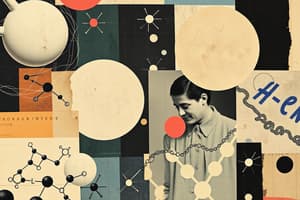Podcast
Questions and Answers
What is the primary focus of pharmacology?
What is the primary focus of pharmacology?
- The study of drug synthesis and development
- The study of the chemical composition of drugs
- The study of the effect of drugs on biological systems (correct)
- The study of drug interactions within the body
Which of the following best describes pharmacodynamics?
Which of the following best describes pharmacodynamics?
- The study of how drugs are absorbed, distributed, and metabolized
- The study of the biochemical, cellular, and physiological effects of drugs and their mechanisms of action (correct)
- The study of drug interactions with other drugs
- The analysis of the effects of drugs on living organisms only
If a researcher is studying how a drug alters heart rate, which field of study are they primarily working in?
If a researcher is studying how a drug alters heart rate, which field of study are they primarily working in?
- Pharmacodynamics (correct)
- Pharmacokinetics
- Medicinal Chemistry
- Toxicology
A scientist discovers a novel drug. Which area of study will they investigate to understand its mechanism of action at a cellular level?
A scientist discovers a novel drug. Which area of study will they investigate to understand its mechanism of action at a cellular level?
What is the study of how drugs affect living systems called?
What is the study of how drugs affect living systems called?
When studying the effects of a drug at the cellular level, what is the primary focus?
When studying the effects of a drug at the cellular level, what is the primary focus?
Which level of drug action investigates how a drug affects a specific biological system, like the digestive system?
Which level of drug action investigates how a drug affects a specific biological system, like the digestive system?
Which category of regulatory proteins includes proteins that facilitate the movement of molecules across cell membranes?
Which category of regulatory proteins includes proteins that facilitate the movement of molecules across cell membranes?
What type of regulatory protein catalyzes biochemical reactions in the body?
What type of regulatory protein catalyzes biochemical reactions in the body?
A clinical trial measuring a medication’s influence on blood pressure in patients is an example of studying which type of drug action?
A clinical trial measuring a medication’s influence on blood pressure in patients is an example of studying which type of drug action?
Which protein class do drug molecules commonly interact with to modulate cellular signalling?
Which protein class do drug molecules commonly interact with to modulate cellular signalling?
Studying how a drug affects the spread of a disease between people involves what level of drug action?
Studying how a drug affects the spread of a disease between people involves what level of drug action?
If a drug inhibits a specific enzyme within a cell, what level of drug action is primarily being investigated?
If a drug inhibits a specific enzyme within a cell, what level of drug action is primarily being investigated?
A drug blocks the flow of sodium ions through a protein. Which regulatory protein is most likely the target?
A drug blocks the flow of sodium ions through a protein. Which regulatory protein is most likely the target?
Besides enzymes, carrier molecules, ion channels, and receptors, which other protein is mentioned as a drug target?
Besides enzymes, carrier molecules, ion channels, and receptors, which other protein is mentioned as a drug target?
What is a key characteristic of therapeutic biologics?
What is a key characteristic of therapeutic biologics?
In recent years, what trend has been observed in the approval of new drugs?
In recent years, what trend has been observed in the approval of new drugs?
Which of these is a primary example of a therapeutic biologic?
Which of these is a primary example of a therapeutic biologic?
What distinguishes genetically engineered enzymes in the context of therapeutic biologics?
What distinguishes genetically engineered enzymes in the context of therapeutic biologics?
What is a key feature of therapeutic biologics in comparison to traditional chemical drugs?
What is a key feature of therapeutic biologics in comparison to traditional chemical drugs?
How do the pharmacological properties of new agents generally differ from traditional small-molecule drugs?
How do the pharmacological properties of new agents generally differ from traditional small-molecule drugs?
What key characteristic defines the pharmacological properties of new agents compared to traditional ones?
What key characteristic defines the pharmacological properties of new agents compared to traditional ones?
What is a primary distinction noted in the text, regarding the function of new agents?
What is a primary distinction noted in the text, regarding the function of new agents?
In the context of drug development, what does the text indicate about the new class of agents?
In the context of drug development, what does the text indicate about the new class of agents?
How are the pharmacological attributes of these new agents described in contrast to traditional treatments?
How are the pharmacological attributes of these new agents described in contrast to traditional treatments?
A drug that binds to a receptor at a site different from the primary binding site, and reduces receptor activity, is best described as which type of antagonist?
A drug that binds to a receptor at a site different from the primary binding site, and reduces receptor activity, is best described as which type of antagonist?
What type of drug-receptor binding involves the temporary attraction between a partially positive hydrogen atom from one molecule and a partially negative atom on another molecule?
What type of drug-receptor binding involves the temporary attraction between a partially positive hydrogen atom from one molecule and a partially negative atom on another molecule?
Which term describes a decreased response to a drug following continued administration?
Which term describes a decreased response to a drug following continued administration?
Up-regulation of receptors is a process that involves:
Up-regulation of receptors is a process that involves:
Which of the following is NOT a mechanism that can lead to desensitization or tachyphylaxis?
Which of the following is NOT a mechanism that can lead to desensitization or tachyphylaxis?
Flashcards
Drug action on cells
Drug action on cells
How a drug affects individual cells, such as changing their function or structure.
Pharmacology
Pharmacology
The study of how drugs affect living organisms and their functions.
Drug action on tissues and organs
Drug action on tissues and organs
The combined effect of a drug on groups of cells that form tissues and organs, like a muscle or the heart.
Pharmacodynamics
Pharmacodynamics
Signup and view all the flashcards
Drug action in the intact organism
Drug action in the intact organism
Signup and view all the flashcards
Pharmacokinetics
Pharmacokinetics
Signup and view all the flashcards
Drug action and the interaction between organisms
Drug action and the interaction between organisms
Signup and view all the flashcards
ADME (Pharmacokinetic Processes)
ADME (Pharmacokinetic Processes)
Signup and view all the flashcards
Drug Receptor Interactions
Drug Receptor Interactions
Signup and view all the flashcards
Biologic Drugs
Biologic Drugs
Signup and view all the flashcards
Therapeutic Biologics
Therapeutic Biologics
Signup and view all the flashcards
Genetically Engineered Enzymes
Genetically Engineered Enzymes
Signup and view all the flashcards
Monoclonal Antibodies
Monoclonal Antibodies
Signup and view all the flashcards
Therapeutic Biologics in Modern Medicine
Therapeutic Biologics in Modern Medicine
Signup and view all the flashcards
New agents
New agents
Signup and view all the flashcards
Pharmacological properties
Pharmacological properties
Signup and view all the flashcards
Distinctly different from traditional drugs
Distinctly different from traditional drugs
Signup and view all the flashcards
Different pharmacological properties
Different pharmacological properties
Signup and view all the flashcards
New agents vs. traditional drugs
New agents vs. traditional drugs
Signup and view all the flashcards
Agonist
Agonist
Signup and view all the flashcards
Antagonist
Antagonist
Signup and view all the flashcards
Allosteric Modulator
Allosteric Modulator
Signup and view all the flashcards
Dose-Response Curve
Dose-Response Curve
Signup and view all the flashcards
Affinity
Affinity
Signup and view all the flashcards
Drug Target Proteins
Drug Target Proteins
Signup and view all the flashcards
Enzymes as Drug Targets
Enzymes as Drug Targets
Signup and view all the flashcards
Carrier Molecules as Drug Targets
Carrier Molecules as Drug Targets
Signup and view all the flashcards
Ion Channels as Targets
Ion Channels as Targets
Signup and view all the flashcards
Receptors as Drug Targets
Receptors as Drug Targets
Signup and view all the flashcards
Study Notes
Pharmacology Terminology
- Pharmacology is the study of drug effects on living systems.
- Pharmacodynamics is the study of drug effects, mechanisms of action on the biochemical, cellular, and physiological levels.
Drug and Medicine Definitions
- A drug is a chemical substance (not a nutrient) of known structure that, when administered to a living organism, produces a biological effect.
- A medicine is a chemical preparation that usually contains one or more drugs, administered to produce a therapeutic effect. Medications often contain other substances (excipients, preservatives, solvents) to aid in use.
Drug Effects not Involving Receptors
- Drugs can interact with bodily functions.
- Some drugs affect cell membranes non-specifically.
- Some drugs interact with small molecules or ions.
Proteins and Drug Binding
- Enzymes, carrier molecules, ion channels, and receptors are common protein targets for drug binding.
- Drugs can inhibit or stimulate enzymatic activity.
- Drugs can affect the permeability of cell membranes.
- Drugs can interact with DNA.
Receptor-Related Diseases
- Myasthenia gravis
- Some forms of insulin resistance diabetes
- Testicular feminization
- Familial hypercholesterolemia
- Various endocrine diseases
Receptor Properties
- Sensitivity
- Selectivity
- Specificity
Receptor Regulation
- Desensitization
- Tachyphylaxis
- Down-regulation
- Up-regulation
Receptor Classification Methods
- Pharmacological analysis
- Ligand binding
- Molecular cloning
- Analysis of biochemical pathways
Types of Receptors
- Ligand-gated ion channels
- G-protein-coupled receptors
- Kinase-linked receptors
- Nuclear receptors
Drug Action in Relation to Biological Organization
- Molecular drug action
- Drug action on sub-cellular structures
- Drug action on cells
- Drug action on tissues and organs
- Drug action in the intact organism
- Drug action and inter-organism interactions
Agonists and Antagonists
- Agonists are drugs that bind to receptors and trigger a response (primary, allosteric, inverse, partial).
- Antagonists are drugs that bind to receptors and block a response (competitive or non-competitive).
Dose-Response Curves
- ED50 (effective dose 50): dose causing a response in 50% of individuals
- Quantal dose-response curves show percentage of population responding to a given dose.
Types of Drug Action
- Competitive antagonism
- Noncompetitive antagonism
- Potentiation
- Efficacy (maximum effect)
- Potency (dose required to produce effect)
Drug Actions on Enzymes
- Specific enzyme inhibition
- Examples exist of drugs that inhibit or stimulate specific enzymes.
Examples of Drug Action
- Salbutamol, Aminophylline are examples in asthma treatment
- Many other specific examples of drugs discussed.
Studying That Suits You
Use AI to generate personalized quizzes and flashcards to suit your learning preferences.




